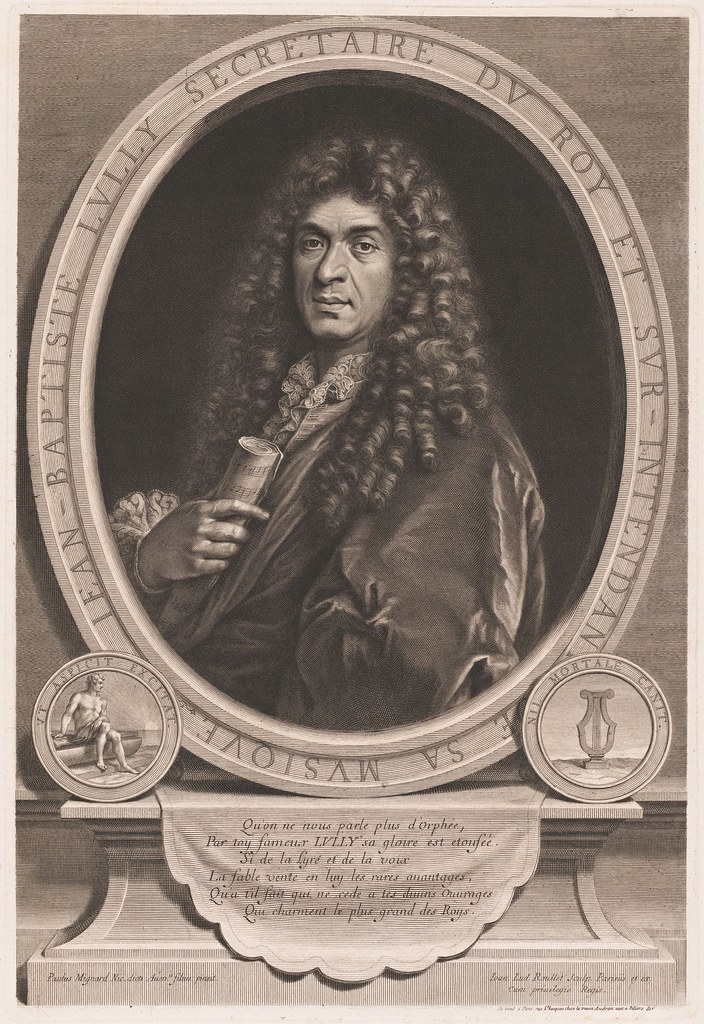Jean Baptiste Lully (1632-1687)
- Ouverture avec tous les Airs de l'opéra Atys (1676)
Performers: Capriccio Basel Baroque Orchestra; Dominik Kiefer (conductor)
Further info: Jean Baptiste Lully (1632-1687) - Te Deum (1677)
---
French composer, violinist and dancer. Born Giovanni Battista Lulli, he
was the second son of a Tuscan farmer, Lorenzo Lulli (1599-1667). Little
is known of the son’s education. Perhaps he learned the fundamentals of
music from the friars of the Via Borgo Ognissanti in Florence. Somehow,
possibly as early as 1645, he managed to be appointed as a tutor of
Italian to Anne- Marie-Louise d’Orléans, cousin of King Louis XIV of
France. In February 1646, Lully moved to Paris. A source printed in 1695
identifies Lully’s teachers from this point: the organists at the
church of St. Louis of Rue Saint-Antoine, Nicolas Métru and Nicolas
Gigault, the violinist Jacques Cordier, and the dancer Jean Regnault.
Possibly through Regnault, Lully entered the service of Louis XIV and
danced in the Ballet Royal de la Nuit, caught the eye of the king, and
was appointed compositeur de la musique instrumentale on 16 March 1653.
His dancing and obvious talent for composition allowed Lully to persuade
the king to establish an instrumental ensemble apart from his official
one, Les Vingtquatre Violons du Roi. Lully was able to form the new
orchestra, Les Petits Violons, according to his own ideas of ensemble
playing, and it would become famous throughout Europe. In 1656, Les
Petits Violons made its debut in the ballet Les Galanteries du Temps,
the earliest surviving ballet composed entirely by Lully. On 24 July
1662, he married Madeleine Lambert, a composer’s daughter 20 years of
age. They had six children. To this point, Lully as composer had
contributed chiefly to court ballets. But age began to curtail his
dancing, and he retired as a dancer by 1668. In 1664, however, he
entered upon a second stage of his career as composer: a collaboration
with the great dramatist Jean-Baptiste Poquelin (1622-1673), known by
his stage name Moliére, on a series of comédies-ballets, comic dramas in
which Lully’s dance music interweaves with Molière’s poetry, beginning
with Le Mariage Forcé (29 January 1664), including Le Bourgeois
Gentilhomme (14 October 1670), and concluding with Psyché (17 January
1671).
In March 1672, Lully was to able buy the royal privilege of producing
“academies for opera . . . in the French language”—essentially a patent
for a monopoly granted by Louis XIV—from its original holder, the poet
Pierre Perrin (c.1620-1675), and immediately moved to establish the
Académie Royale de Musique. Because the privilege brought no court
financing of the new venture, Lully entered into a partnership with
long-time acquaintance and theater architect Carlo Vigarani (1637-1713)
in August 1672, and together they adapted a tennis court for their
productions. They began with Les Fêtes de L’Amour et de Bacchus, a
pastiche made of Lully’s earlier ballet music, and they mounted the
first original tragédie lyrique in April 1673, Cadmus et Hermione. This
created a sensation, luring the king to the tennis court to see it. By
28 April 1673, the king authorized Lully to use the Palais Royal theater
rent-free, and after the opening of Alceste in January 1674, Louis
brought the business of tragédie lyrique into the court, supported by
the court’s sets, costumes, and machinery and by funded rehearsals. With
such backing, Lully produced a new opera nearly every year until he
died in 1687, usually working with the great librettist Philippe
Quinault (1635-1688). His control of the royal opera privilege virtually
eliminated all rivals from Paris, although he did allow provincial
opera companies to operate. He also managed the Palais Royal almost as a
monopoly, setting high prices for seats. The royal privilege allowed
him to earn royalties on his printed librettos and, after 1677,
royalties from prints of his music. From then on, he published complete
scores of all his tragédies lyriques, a phenomenon unknown in the rest
of Europe, where opera scores were lucky to survive in manuscript. In
December of 1686, while conducting his Te Deum at the Church of the
Feuillants, he wounded himself in the foot. The wound became gangrenous,
and Lully died on 22 March 1687.

Cap comentari:
Publica un comentari a l'entrada